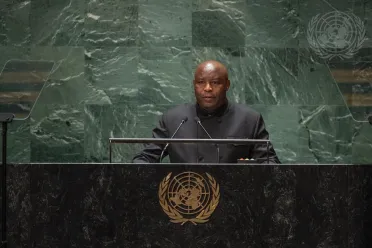Statement
Statement summary
EVARISTE NDAYISHIMIYE, President of Burundi, said that “While we gather every year in such forums and even in other equally important circumstances, the world continues to face serious existential threats, thus unfortunately becoming more and more unstable and vulnerable.” Turning to his own country, he emphasized that after years of instability, the process of truth and reconciliation is bearing fruit. “However, the sad truth is that public development assistance, which should support the Government’s efforts as it seeks the well-being of citizens, has little by little faded away in favour of funding intended for non-State actors serving the unacknowledged geopolitical and economic interests of certain so-called donor States,” he said. In that regard, he highlighted the urgent need of rethinking and strengthening the global partnership which includes debt relief, a substantial increase in resources devoted to the fight against poverty, strengthening South-South cooperation, sharing of technologies and innovation as well as broadening commercial agreements.
“Burundi has made significant progress in terms of democracy, good governance and improving its business climate,” he said, adding that it strives to promote and finance the agricultural sector through a national agricultural subsidy programme which subsidizes fertilizers, selected seeds and plant health products. His Government has also updated the country’s mining code to create a favorable environment for investors in the sector whose abundant mineral potential remains underexploited. Citing the ambition of his Government to raise the economy by utilizing natural resources, he announced: “The goal is to make Burundi an emerging country in 2040 and a developed country in 2060.”
Stating that there is no more effective weapon than youth in the fight against poverty and in conflict prevention, he welcomed the General Assembly decision to create a United Nations Youth Office. To expedite the implementation of the 2030 Agenda, free education — available in Burundi since 2005 — has enabled children to have the right to a quality education, he said. Burundi has also improved the ratio of men to women in the political arena by setting the representation of women in the National Assembly and the Senate at 30 per cent. Today, women hold around 50 per cent of the positions in Burundi’s Government, he also noted.
He recalled that within the East African Community a series of actions to restore peace and security in the east of the Democratic Republic of the Congo was launched, while Burundi also participates in peacekeeping operations and the fight against terrorism in the Central African Republic and Somalia. “We also condemn the re-emergence of unconstitutional changes of power which constitute a serious erosion of democratic gains recorded for several years in Africa,” he said. Referring to the drawdown of the African Union Transition Mission in Somalia (ATMIS), he warned against its hasty closure, which could give terrorist groups an opportunity to grow stronger and regroup. Regarding migration flows, he called for adopting appropriate and concerted measures enabling young people to improve their chances of finding decent work, self-employment or entrepreneurship. “However, while awaiting a lasting solution to poverty, countries of transit and destination must understand and provide dignified and humane assistance to migrants and guarantee them their fundamental human rights,” he urged, also condemning States which, under the pretext of protecting human rights, interfere in the domestic affairs of other States. He reaffirmed Burundi’s commitment to the democratization of the multilateral system, including the reform of the UN Security Council and the international financial system to make them more representative, fair and inclusive.
Full statement
Read the full statement, in PDF format.
Photo

Previous sessions
Access the statements from previous sessions.
